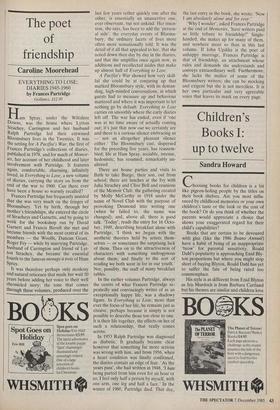The poet of friendship
Caroline Moorehead
EVERYTHING TO LOSE: DIARIES 1945-1960 by Frances Partridge Gollancz, f12.95 Ham Spray, under the Wiltshire Downs, was the house where Lytton Strachey, Carrington and her husband Ralph Partridge led their entwined Bloomsbury lives in the Twenties. It was the setting for A Pacifist's War, the first of Frances Partridge's collections of diaries, published in 1978, and for much of Memor- ies, her account of her childhood and later involvement with Partridge. It features again, comfortable, charming, infinitely loved, in Everything to Lose, a new volume of diaries, carrying the story on from the end of the war to 1960. Can there ever have been a house so warmly recalled? Frances Partridge has frequently insisted that she was very much on the fringes of Bloomsbury. Yet by birth, through her mother's friendships, she entered the circle of Stracheys and Garnetts, and by going to work for the bookshop run by David Garnett and Francis Birrell she met and became friends with the most central of its members — the Woolfs, Duncan Grant, Roger Fry — while by marrying Partridge, husband of Carrington and friend of Lyt- ton Strachey, she became the essential fourth to the famous menage a trois of Ham Spray.
It was therefore perhaps only modesty and natural reticence that made her wait 50 years before adding her voice to their well chronicled story; the tone that comes through these volumes, produced over the last few years rather quickly one after the other, is essentially an unassertive one, ever observant, but not unkind. Her inten- tion, she says, has been to add the 'person- al side', the everyday events of Blooms- bury, the ordinary facets of lives more often more sensationally told. It was the detail of it all that appealed to her, that she
noted down then day by day in the diaries, and that she amplifies once again now, in additions and recollected asides that make up almost half of Everything to Lose.
A Pacifist's War showed how very skill- ful she could be at conjuring up that
marked Bloomsbury style, with its deman- ding, high-minded conversations, in which guests had to measure up and behaviour mattered and where it was important to let
nothing go by default. Everything to Lose carries on smoothly where the early diaries
left off. The war has ended, even if 'one
was at no time aware of actually coming out; it's just that now out we certainly are
and there is a curious silence embracing us — not an altogether pleasant silence either.' The Bloomsbury cast, dispersed for the preceding five years, has reassem- bled; life at Ham Spray, sociable, intense, hedonistic, has resumed, remarkably un- altered.
There are house parties and visits to Bath to take Burgo, their son, out from school; there are lunches at the Ivy with Julia Strachey and Clive Bell and reunions of the Memoir Club, the gathering created by Molly McCarthy in 1918 under the name of Novel Club with the purpose of provoking Desmond into writing one (when he failed to, the name was changed); and, above all, there is good talk. 'Today', reads the entry for 16 Octo- ber, 1949, describing breakfast alone with Partridge, 'I think we ,began with the aesthetic theories held by artists them- selves — or sometimes the surprising lack of them. Then on to the attractiveness of characters with something androgynous about them; and finally to the sort of reading we both went in for in our youth.' Not, possibly, the stuff of many breakfast tables.
In the earlier volumes Partridge, always the centre of what Frances Partridge re- peatedly and convincingly writes of as an
exceptionally happy life, was a shadowy figure. In Everything to Lose, more than
ever the focus of her life, he remains just as elusive, perhaps because it simply is not possible to describe those too close to one. It is their life together, the effects on her of such a relationship, that really comes across.
In 1953 Ralph Partridge was diagnosed as diabetic. It gradually became clear however that something far more serious was wrong with him, and from 1956, when a heart condition was finally confirmed, the diaries contain an edge of fear. 'As the years pass', she had written in 1948, 'I hate being parted from him even for an hour or so; I feel only half a person by myself, with one arm, one leg and half a face.' In the winter of 1960, Partridge died. That day, the last entry in the book, she wrote: 'Now I am absolutely alone and for ever.'
`Why I wonder', asked Frances Partridge at the end of Memories, 'have writers paid so little tribute to friendship?' Single- handed, she makes up for many of them, and nowhere more so than in this last volume. If John Updike is the poet of unhappy marriage, Frances Partridge is that of friendship, an attachment whose rules and demands she understands and conveys extraordinary well. Furthermore, she lacks the malice of some of the Bloomsbury writers; she can be mocking and exigent but she is not merciless. It is her own particular and very agreeable voice that leaves its mark on every page.


































































 Previous page
Previous page